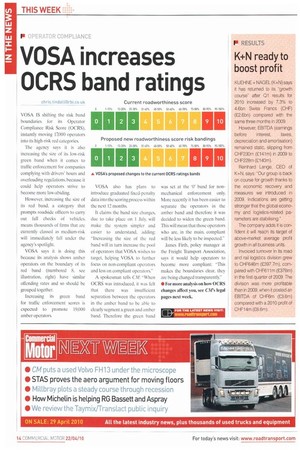VOSA increases OCRS band ratings
Page 14

If you've noticed an error in this article please click here to report it so we can fix it.
chris.tindatliarbi.co.uk VOSA IS shifting the risk hand boundaries for its Operator Compliance Risk Score (OCRS). instantly moving 17,000 operators into its high-risk red categories.
The agency says it is also increasing the size of its low-risk green hand when it comes to traffic enforcement for companies complying with drivers' hours and overloading regulations, because it could help operators strive to become more law-abiding.
However. increasing the size of its red band, a category that prompts roadside officers to carry out full checks of vehicles. means thousands of firms that are currently classed as medium-risk will immediately fall under the agency's spotlight.
VOSA says it is doing this because its analysis shows amber operators on the boundary of its red band (numbered 8. see illustration, right) have similar offending rates and so should be grouped together.
Increasing its green band for traffic enforcement scores is expected to promote 19.000 amber operators. VOSA also has plans to introduce graduated fixed-penalty data into the scoring process within the next 12 months.
It claims the band size changes, due to take place on I Jul'. will make the system simpler and easier to understand, adding: "Increasing the size of the red band will in turn increase the pool of operators that VOSA wishes to target. helping VOSA to further focus on non-compliant operators and less on compliant operators.
A spokesman tells CM: "When OCRS was introduced, it was felt that there was insufficient separation between the operators in the amber band to be able to clearly segment a green and amber band. Therefore the green hand was set at the 'V band for nonmechanical enforcement only. More recently it has been easier to separate the operators in the amber band and therefore it was decided to widen the green hand. This will mean that those operators who are, in the main, compliant will be less likely to he inspected."
James Firth. policy manager at the Freight Transport Association, says it would help operators to become more compliant: "This makes the boundaries clear. they are being changed transparently."
• For more analysis on how OCRS changes affect you, see CM's legal pages next week.
































































































































